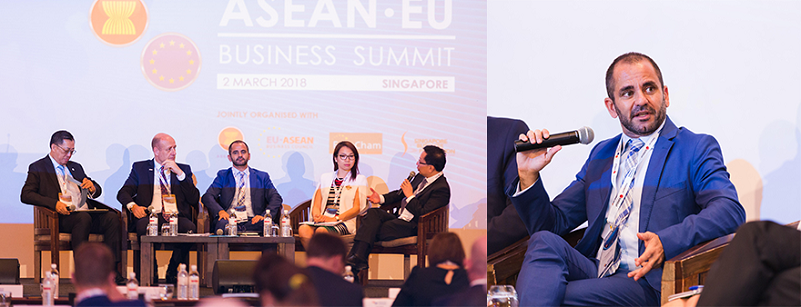BASF Construction Chemicals shares views on how to be environmentally sustainable while maximizing infrastructure and economic development

Dr. Hicham Abel, Senior Vice President for BASF Construction Chemicals Asia Pacific, shared his perspectives as part of a panel discussion at the 6th ASEAN-EU Business Summit 2018, in Singapore on 2 March 2018.
The plenary session examines some of the challenges faced in ASEAN as further economic development puts pressure on both existing infrastructure and the need to put more infrastructure in place. With 90 million more people likely to move into cities in the next 10 to 15 years across Southeast Asia, how can cities remain liveable and environmentally friendly? Can technology play a bigger role in improving lives, reducing the impact on the environment, easing transportation needs? And how can the region afford to plug the infrastructure funding gap?
Following are the viewpoints highlighted in Dr. Hicham's speech:
- At BASF, we create chemistry – for a sustainable future. We combine economic success with environmental protection and social responsibility.
- BASF contributes to the design and construction of “smart growth” all over the world. In our experience, smart growth requires both smart design – in infrastructure, transport, services and buildings – and the right sustainable materials.
- The key challenge for us is to drive innovation: making sustainability more affordable and encouraging regulators to set the right incentives.
- Sustainable construction is developing built environments that balance economic viability with preserving resources, reducing environmental impacts and meeting social needs.
In our view, sustainability can’t be measured in a single metric. Instead, it’s an approach to be rigorously applied to the entire life cycle, whether you are building a skyscraper, a bridge, a tunnel or a waste treatment plant. Sustainability means:
- Reducing emissions (carbon footprint) during the construction processes, in the materials used, and in the operational lifespan
- Conserving water
- Preserving and restoring buildings
- Designing a building to be as energy efficient as possible, maximizing natural light and shading
- Building in resilience to future sea level rise and extreme weather
- Designing for people: promoting “healthy indoor living” with low-toxicity and low-VOC (volatile organic compounds) materials; robust air filtration systems; and maximizing daylight and social space
- Enhancing safety on construction sites by providing solutions that will not expose any workers to safety risks.
- Innovating in new construction systems that produce less dust and sound pollution in the neighborhood of a construction site.
The ASEAN-EU Business Summit was founded in 2011 in Indonesia and has since developed to an established meeting point designed to be a platform for business leaders, thought-leaders and policy makers to interact and debate the key business and trade issues of the day.
Previous editions of the AEBS have been held in Phnom Penh, Cambodia in April 2012; Hanoi, Vietnam in March 2013; Kuala Lumpur, Malaysia in August 2015; and most recently in Manila, Philippines in March 2017, with several hundred delegates attending each event. Visit their website at https://www.asean-eu-summit.org/.


